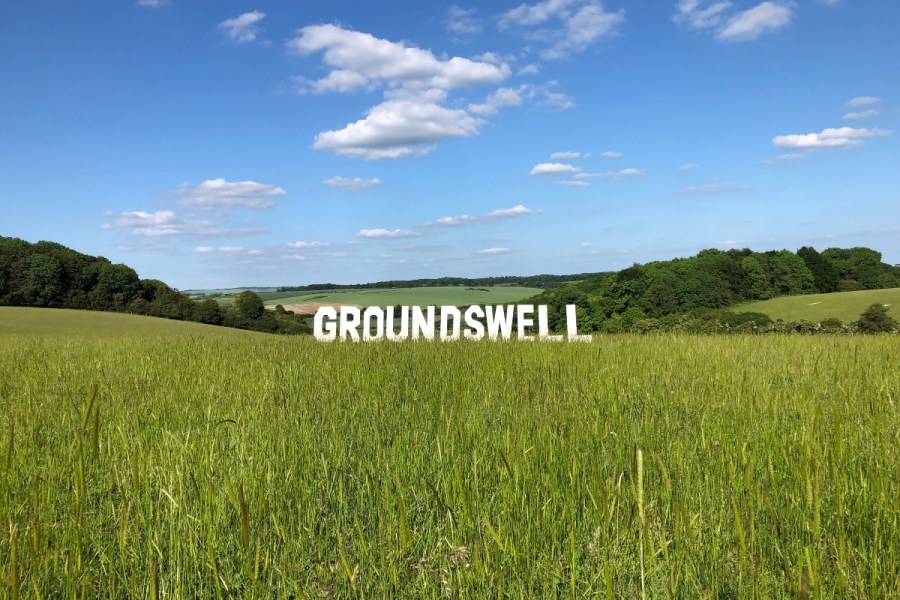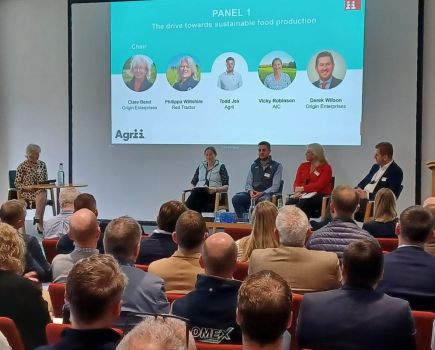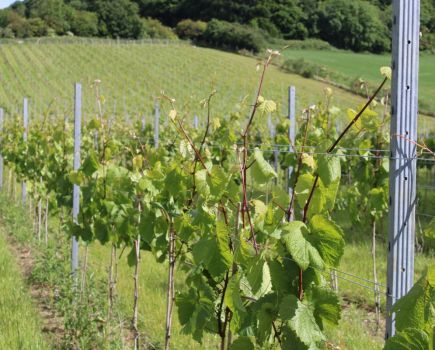As the hunger for knowledge about a more sustainable way to farm grows, this year’s Groundswell (22-23 June 2022) looks set to be bigger and better than ever. CPM previews the event.
The core values are knowledge transfer and industry-wide collaboration.
By Charlotte Cunningham
When the first Groundswell event took place in 2016, there are few who could have predicted just how influential and special the gathering would become.
Now, seven years later, regenerative agriculture is everywhere, with farmers across the country turning back the clock and reverting to some of the more traditional methods of farming in a bid to create sustainable, profitable businesses which farm with the environment and wider biodiversity in mind. And Groundswell has firmly cemented itself as the flagship event for knowledge exchange, idea sharing and pure passion for simply wanting to farm better.
This year’s event is set to be bigger and better than ever, with crop plots, working demonstrations, over 175 exhibitors and a brimming seminar schedule ensuring there really is something on offer for everyone.
Groundswell 2022
Where: Lannock Manor Farm, Hertfordshire, SG4 7EE
When: 22-23 June 2022
Important information: Tickets can be bought online. Camping (glamping and self-camping) options available on site too.
While the term ‘regen’ may mean different things and take different forms to many people, organiser, Alex Cherry, says regenerative agriculture is simply the production of food or fibre which, at the same time, improves the environment.
At the core of the event is the ‘five principles of regenerative agriculture’ of which much of the exhibits and seminars focus on.
These are:
- Don’t disturb the soil
- Keep the soil surface covered
- Keep living roots in the soil
- Grow a diverse range of crops
- Bring grazing animals back to the land
As such, growers will be able to seek the latest advice on cropping for a regenerative arable system, learn more about the impact of cultivations and using holistic techniques to promote soil health, and even get up close and personal to livestock to better understand how these four-legged machines could be the answer to promoting long-term sustainability in arable production.
Therefore, the event is aimed at anyone who simply wants to make better informed decisions, says Alex. “Groundswell is a welcoming, open-minded and innovation-led event. For anyone hoping to be inspired, it’s a chance to take a fresh look at farming and get excited about the future of the industry.”
Crops and kit
Aligning variety choice and establishment methods is fundamental for regenerative success. CPM looks at the crops and kit offerings at this year’s Groundswell.
When it comes to traditional variety selection, one might sit down with the AHDB Recommended List to highlight those of interest and then head to regional sites to see if its paper claims match up with in-field performance.
The priority characteristics may vary from farm-to-farm, but more often than not, it’s yield that’s king – closely followed by the desire to plant something that offers a ‘good all-round’ package. But are these priorities the same when selecting a variety for a regen system?
In a recent survey carried out by CPM (May 2022), growers noted the feeling of a lack of information – stating that they’d like to see more on how varieties perform under low or no nitrogen settings, or different tillage systems, to name a few.
To address some of these thoughts, NIAB’s Dr Phil Howell will be discussing the challenges of breeding the best varieties for regenerative agriculture in the NIAB Seminar Tent on day one (22 June) of this year’s Groundswell.
Ahead of the event, Phil gave CPM a flavour of what he’ll be discussing during his seminar, and an insight into some of the challenges facing breeders and how these may be addressed as the interest grows for regen-suitable varieties.
“It’s often mentioned that for many crops, yields seem to be reaching a plateau. However, we know that in trials, yields are continuing to increase as new varieties are released, which leaves a gap between what’s happening in trials and what’s happening on farm.
“This raises the question of whether our trials and testing system is still the best and fairest way of identifying the best varieties for growers and their customers.”
Breeders are in a difficult situation, reckons Phil. “They want to produce varieties that do well on farm as these will capture market share over a relatively long period. But before they can market these varieties, they have to pass through National List testing, which follows a well-established and rigorous protocol set by APHA.
“However, being added to the National List is rarely enough to guarantee sufficient market share to cover the costs of running a breeding programme, and performing well on the RL – or for more minor crops, a Descriptive List – is the gateway to market success. So, varieties must first clear the hurdles required of the NL/RL testing system before they have a chance to assert themselves on farm.”
Phil adds that this means breeders are left trying to address two overlapping, but different problems: what will do well in the testing system, and what will do well on farm.
“When we move to regenerative farming systems, including organic farming as an extreme example, there’s a bigger discrepancy between the status quo of the testing system and practice on farm. How can breeders possibly produce the best varieties for organic farming through the current testing system?
“Breeding is most effective when selection in early generations most closely matches the situation a finished variety will be in.”
What’s more, breeding is expensive, he adds. “A typical large wheat breeding programme has annual operational costs which run into the millions, so breeders will try and recoup those costs by chasing the largest royalty market, which is still conventional agriculture.”
Phil notes that breeders will screen for varieties better suited to less intensive farming systems, often, but only by testing the few varieties that have emerged at the end of the “selection funnel” rather than earlier in the process, when there is still more useful variation to select from. “So variety improvement for these situations is probably slower than it could be.
“In the Groundswell session I hope to talk in general terms about this problem and include some views from breeding companies and AHDB about steps that have been taken to make new varieties more sustainable.
“My NIAB colleague, Dr Stephanie Swarbreck, will also be on hand to discuss some of the work she has been doing to improve N-use efficiency and soil-root interactions. We will also be joined by Dr Ambrogio Costanzo from Organic Research Centre, who will discuss the approaches the organic sector is taking.”
As well as gleaning the latest cropping advice from the experts in the seminar tents, the Groundswell Agronomy team will also be on hand at the event to provide advice to growers who are keen to explore, or perhaps already on, a journey towards implementing a more regenerative system.
The Groundswell Agronomy team is made up of agronomists and consultants with a shared passion for the regenerative production of food, fibre and renewable energy.
“The biggest challenge to adopting regenerative agriculture really is working out how to do it – coming from an industrial farming background, like most of us are, and then trying to completely change the system,” says host farmer, John Cherry.
“One of the reasons we set up Groundswell Agronomy was so that people could find agronomists who were talking the same language.”
On the team is Richard Harding, who says that the service can provide all sectors of agriculture with the solutions they require to maintain and improve farm business profitability in the face of a gradual reduction in BPS, growing environmental concerns over conventional food production, and a need to move beyond sustainable to a truly regenerative agricultural system. “Groundswell Agronomy is a service available to anyone interested in investigating anything from a full system rethink to just one specific technique, and can be tailored to provide as much or as little on-going support as required. The core value of the service is knowledge transfer and industry-wide collaboration.”
And for those who want to see crops in the ground, KWS will be presenting a number of varieties, alongside cover crop plots from Kings Crops. Barenbrug also have a number of grass and herbal ley plots.
What’s more, there will be a chance to see the results from a biostimulant trial which has taken place on site. This tramline trial will see products from Amino A, Unium, Nutricor, Aiva Fertiliser, Timac Agro and Interagro go head-to-head in a bid to let growers see for themselves if the proof really is in the pudding when it comes to using biostimulants.
And it’s not just about what you put in the ground, but also how you do it…
While moving to a less invasive approach to soil movement is part of the foundations of the regenerative movement, the financial investment in machinery is often noted as a barrier to growers hoping to embark on the transition.
Therefore, ensuring any investment aligns with farm priorities is key, and to help growers do just that, this year’s Groundswell will once again feature a direct drill demonstration zone to allow growers to compare the performance of some of the leading direct drills in real life conditions – as well as a range of static kit on display.
Manufacturers taking part in the demonstration zone include:
- Amazone
- Claydon
- Primewest
- Dale Drills
- Horizon Agriculture
- Horsch
- John Deere
- Kverneland
- Novag
- Ryetec
- Samagri
- Simtech T-Sem
- Sumo
- Opico
- Weaving machinery
Seminars
With a jam-packed schedule planned over the two days, CPM takes a look at some key themes of the seminar programme at this year’s Groundswell event.
Not often at events do questions from the audience spark such thought-provoking discussions that the idea sharing continues long after the chairman wraps up a seminar session. But Groundswell is very much the exception.
And bringing together the very best brains of regenerative farming, the scope of this year’s seminar programme is somehow bigger and better than ever before. It covers a range of topics from carbon farming, soil health, the importance of linking arable and livestock production, the role of policy in the future of regenerative farming, and how farmers can better communicate with consumers.
The format is a mixture of seminars, demonstrations, panel sessions and workshops, taking place across a whopping eight stages: the Agricology Discussion tent; the Barenbrug Grass tent; Big Top; the Breakout tent; the Kellogg’s Origins Soil tent; the NIAB seminar tent; Speaker’s Corner and the Yeo Valley Old Dairy tent.
Host farmer John Cherry will be among those stepping into the spotlight as he takes part in a panel discussion about what regenerative really means – beyond farming practices – and explores how farmers, producers, brands and businesses can adopt a truly regenerative mindset and approach to healing people and the land. John will be joined by Abby Rose, farmer, physicist, and soil health advocate, as well as Dee Woods – an award-winning cook, broadcaster and researcher with over 25 yearsexperience.
Visitors will also get the chance to quiz George Eustice once again this year, with the Secretary of State making two appearances in the seminar schedule. On day two (23 June) he’ll be joined by other leading industry figures, including Rosie Boycott and Minette Batters, for a panel session in the Big Top at 10:45am.
The environment secretary will also be in the spotlight later in the day in the Agricology Discussion Tent to tackle the all-important question: what can policy makers do to support regenerative farming? He’ll be joined by Henry Dimbleby and MPs Ruth Edwards and Oliver Heald, as well as beef farmer, Ian Davis.
With industry-wide collaboration often highlighted as fundamental for driving change, visitors will also be treated to an insight into regen from a global perspective through Dwayne Beck, in the Kellogg’s Origins Soil tent. He will be asking the question: are we doing the ‘right things’ or only doing the wrong things better?
Dwayne is a professor in plant science and well-known in the regen world. He’s also currently the research manager at Dakota Lakes Research Farm in Pierre, South Dakota.
His emphasis is on developing no-till systems for irrigated and dryland areas in central South Dakota, and says his primary achievements deal with development of programmess that have allowed producers to profitably adopt no-till techniques in a large portion of central South Dakota. The identification of the extremely important role played by crop rotation in minimising weed, disease, and insect problems while increasing potential profitability was the key contribution of this project.
The Dakota Lakes Research Farm consists of 324ha of land, of which about 101ha is irrigated, and the entire operation is managed using no-till techniques.
For those looking for a more interactive discussion, a must-see is the rainfall simulator in the Big Top, led by Dr Jill Clapperton of Rhizoterra, which will showcase the dramatic effect of 5cm of rainfall on soils under different management regimes: no-till and cultivated, with and without cover and under permanent pasture.
And for the younger generation, or those looking for a way into the industry, the NIAB Seminar Tent will be hosting a session on removing barriers for young people in farming. Hosted by David Fursdon, farmer and consultant, this session will delve deeper into the work of the Prince’s Countryside Fund in supporting succession, progression and new entrants into farming. Visitors will hear from Liz King, project officer, about the opportunities for young people, as well as two young farmers – Liz Tree and Chris Woodhead – who will share their experiences.
See the full schedule in the June issue of CPM.
Groundswell afterhours
For those looking to continue the conversations into the wee hours, this year’s event will see the return of the famous Earthwork Arms bar, plus an array of independent food and drink traders serving the night before and during the event, with live music playing into the evening on the 22 June. On site camping is available via advanced booking.
The SSAW Collective are also hosting a three-course long table banquet on both the 21 and 22 June and tickets can be reserved online.




